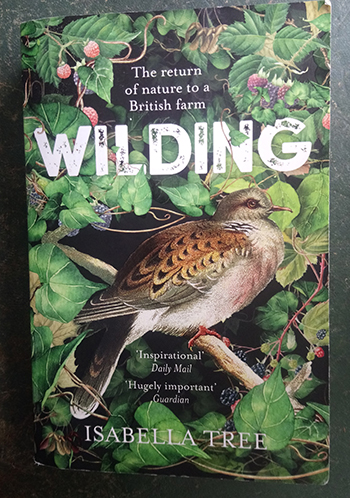Wilding, the return of nature to a British farm, Isabella Tree. 2018, pub. Picador
 If I was writing a review for the back of this book I think “thought provoking” would do nicely. Given freedom to add another word, I’d go for “extremely thought provoking”. Having read the book in the spring after my wife kept quoting from it, saying “listen to this!” I reread it and got more from it the second time through and decided to write this review.
If I was writing a review for the back of this book I think “thought provoking” would do nicely. Given freedom to add another word, I’d go for “extremely thought provoking”. Having read the book in the spring after my wife kept quoting from it, saying “listen to this!” I reread it and got more from it the second time through and decided to write this review.
Written by the owner of the Knepp Estate, a large Sussex farming business, it is an account of her and her husband’s experiences since the late 1990s, of changing the business from intensive arable and dairy farming to lightly controlled wilderness, funded both from the public purse and a growing wild meat and tourism business.
On first reading I was pretty shocked by the author’s demands of DEFRA and English Nature (as was), that they should fund a project that would not only take land out of production but allow it to scrub up and become incapable of food production. Their proposal required the whole to be fenced to keep deer and other stock in. Bearing in mind that the whole estate is 3500 acres, that’s one long fence – something like 9 miles and over £250,000 worth in 2009. The original scheme also proposed a land bridge to allow animals to cross the A272 safely. No figures were suggested for the cost of that and it hasn’t happened so far. A significant reason for choosing to withdraw from intensive agriculture was their problem making a profit from the estate because it lies on famously claggy Sussex clay.
There are mentions of a stud manager and polo ponies, descriptions of castles and ancient deer parks. I became outraged. Not because they wanted to take their farm out of food production (Isabella Tree makes very convincing arguments in favour of that move), but because they wanted the government and EU to pay for it through Environmental Stewardship and were highly critical of those government bodies that didn’t move immediately to do their bidding. Moreover, I was angry because they felt entitled to receive funding and had the contacts, forcefulness, and self-confidence to stir things up at a high level. So a bit of jealousy and class struggle was going on beneath the surface on my part.
I read the rest of the book in a bit of a lather and skimmed a whole lot of interesting things. These included the chapters about nightingales, purple emperor and painted lady butterflies, the Oustvaardersplassen, beavers, turtle doves, renewable power, ragwort and, most interesting for the purposes of Cleft Stick readers, coppicing and forestry management. I wasn’t fully concentrating.
On the last Saturday in June this year I was sitting, with my family, drinking a beer in a wood we manage. Gazing vaguely upwards, I spotted a large butterfly I didn’t recognise, flying quickly overhead. After some time chasing it fairly unsuccessfully and more time spent watching my wife balancing alarmingly on top of some step ladders, armed with a camera, we thought it just might be a purple emperor. Very excitingly, through July we saw, photographed and positively identified several more of these (all male) butterflies. On trying to find out about their habits I contacted our local natural history society who confirmed there had been other sightings locally. Information about the management of a wood, detailed enough for someone like me who might want to maintain a population, seemed sketchy. If only I’d been concentrating on ‘Wilding’. Within its pages are nuggets of wisdom about exactly where the females lay their eggs and how they overwinter, what sort of sallow in which kinds of locations they favour. Luckily on second reading this sunk in. The same is true of the nightingales, turtle doves, beavers and a whole load of other stuff. None of these have appeared in our wood yet though.
The book is full of amazing stuff and the research, both rigorous and more empirical is, I am sure, building a wealth of knowledge that will be extremely useful in the future. I hear wilding has reached the Archers (apparently, a well-known, BBC radio sit-com) and that’s about as mainstream as these things get. It has changed somewhat the way we are looking at the future of some of the land we look after and that’s quite an achievement.
Six months have passed and I’ve calmed down a lot, but my initial unease remains. Should some pretty wealthy landowners in southern England be paid large amounts of money by British and European tax payers to abandon their 3500 acres of farmland to nature? Or to look at it another way, to allow their farm to become an appalling haven for weeds and other vermin, or maybe a third way, to create an amazingly dense patchwork of habitats that attract wildlife on a scale and of a diversity not seen in England since the seventeenth century? On balance I think I’d say yes.
